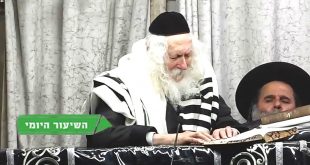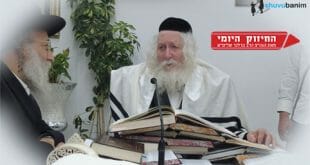לפניכם דברי תורה לפרשת השבוע מתוך שיעור שמסר הגה"צ רבי אליעזר ברלנד שליט"א במיוחד לפרשת בֹּא:
שואל הקול שמחה: מדוע כאן ה' לא אמר למשה איזה מכה לתת, הוא לא אומר לו, "בא אל פרעה" הוא לא אומר לו איזה מכה. עם הדם, צפרדע, כינים, ערוב, דבר, שחין, ברד, כל מכה שהוא אומר לו; "עכשיו יהיה דם, עכשיו יהיה צפרדע, עכשיו יהיה כינים, עכשיו יהיה ערוב, עכשיו יהיה שחין, דבר ברד…" פה הוא לא אומר לו איזה מכה, "ויאמר ה' אל משה בא אל פרעה" הוא לא אומר לו איזה מכה, "כי אני הכבדתי את לבו ואת לב עבדיו את אשר התעללתי במצרים ואת אותותי אשר שמתי בם" למה הוא לא אומר לו איזה מכה? הוא הולך לתת לו, אז באמת אומר אז אומר כאן הקול שמחה – רבי שמחה בונים מפשיסחא; שהקב"ה רצה שמכה אחת הצדיק בעצמו יבחר! מכה אחת זה הבחירה של הצדיק, שמשה בעצמו יבחר. ה' אמר למשה אתה בעצמך תחליט איזה מכה לתת לו, אתה תחפש איזה מכה הכי מתאימה לתת לו. איזה מכה שירצה, אתה תבחר איזה מכה.
אומר על זה הייטב לב האבא של קדושת הלוי – סבא של הרבי מסאטמער הקודם שנפטר, אז הוא מביא כאן בפרשת בא מביא מר' שמשון מאוסטרופולי; כתוב "בא אל פרעה למען שתי אותותי אלה בקרבו" – אומר לו "בקרבו" כי בשם של הבן אדם נרמז כל מה שצריך לעבור עליו. ה' אמר למשה: אתה תמצא בתוך הפרעה, בקרבו של פרעה, בתוך פרעה, אתה תמצא את המכה שהוא צריך לקבל. כי כל מה שעובר על הבן אדם במשך החיים שלו הכל מרומז בשם שלו. לכן שאדם עולה למעלה שואלים אותו מה שמו. ואומרים לו: אתה לא השתמשת בשם שלך, היית צריך ללכת לפי השם שלך, היית מגיע לכל הדברים בעולם, השם של האדם מרמז לו כל מה שהוא צריך לעבור, כל מה שהוא צריך לעשות, כל מה שהוא צריך ללמוד, הכל מרומז בשם של הבן אדם.
אז ה' יתברך אומר למשה "בא אל פרעה כי אני הכבדתי את לבו ואת לב עבדיו למען שתי אותותי אלה בקרבו" אז אומר ר' שמשון מאוסטרופולי "אותותי אלה בקרבו" – בקרבו ממש, בקרבו שם, בתוך השם שלו! שם באותיות של השם שלו, שם מרומז מכת ארבה. איך מרומז מכת ארבה בתוך האותיות של פרעה? למען "שתי אותותי אלה בקרבו" בתוך האותיות של "בקרבו" בפרעה שם מרומז המכה שהוא צריך לקבל. שואל הייטב לב: "אשר שמתי בתוך האותיות האלה את מיליהם הנעלמות אשר בא מכח הסיפור שני עניינים אלה יגיעו אל האמונה וידעו בידיעה שלא בריאה כי אני ה' הטמיר והנעלם אני אני הטמיר והנעלם".
"למען שתי אותותי אלה בקרבו" בתוך המילה פרעה – תכניס את המילה "בא", במקום "פר" – תחליף את הפ' בב' ותחליף את הע' ותחלף את הע' בא' ואז יצא "ארבה". העיקר המכה זה שהצדיק בוחר המכה האמיתית שפרעה קיבל זה היה המכה שמשה בחר אותה על פי הרמזים שה' נתן לו. ה' אמר אני לא אגיד לך איזה מכה. "בא אל פרעה … למען תספר באוזני בנך ובן בנך את אשר התעללתי במצרים".
השיעור עבר עריכה ואם נפלה טעות אין לתלותה ח"ו במורינו הרב שליט"א אלא בכותב "ואיתנו תלין משוגתנו".
 שובו בנים הרב אליעזר ברלנד שליט”א – אתר ברסלב הרשמי הבינלאומי של שובו בנים
שובו בנים הרב אליעזר ברלנד שליט”א – אתר ברסלב הרשמי הבינלאומי של שובו בנים






In English:
Before you are the words of Torah for the weekly portion from a lecture given by the esteemed Rabbi Eliezer Berland, may he be well, specifically for the portion of Bo:
The voice of joy asks: Why doesn't the Lord tell Moses which plague to bring? He doesn't say to him, "Come to Pharaoh," and he doesn't tell him which plague. With the blood, frogs, lice, mixture, pestilence, boils, hail, any plague He tells him; "Now there will be blood, now there will be frogs, now there will be lice, now there will be a mixture, now there will be pestilence, speak the hail…" Here He doesn't tell him which plague, "And the Lord said to Moses, 'Come to Pharaoh'"—He doesn't tell him which plague, "for I have hardened his heart and the hearts of his servants that I may show these signs of Mine among them." Why doesn't He tell him which plague? He's going to bring it, so truly at that moment, the voice of joy says – Rabbi Shmaya Bonim of Pshischa; that the Holy One, blessed be He, wanted that for one plague, the righteous himself would choose! For one plague, this is the choice of the righteous, that Moses himself would choose. The Lord said to Moses, "You yourself will decide which plague to bring, you will find which plague is most suitable to give him. Whatever plague he desires, you will choose which plague.
The great-grandfather of the Holy Levi – the grandfather of the previous Satmar Rebbe, when he passed away, brings here from Rabbi Shmuel of Ostropolia; it is written "Come to Pharaoh so that I may place these signs of Mine in his midst" – He tells him "in his midst" because everything a person needs to go through is hinted in his name. The Lord said to Moses: You will find within Pharaoh, in the midst of Pharaoh, inside Pharaoh, you will find the plague he needs to receive. For everything a person goes through in his life, everything is hinted in his name. Therefore, when a person ascends, they ask him his name. And they say to him: You did not use your name, you should have gone according to your name, you would have reached everything in the world, the name of the person hints to him everything he needs to go through, everything he needs to do, everything he needs to learn, everything is hinted in the name of the person.
So the blessed Lord says to Moses, "Come to Pharaoh, for I have hardened his heart and the hearts of his servants, that I may place these signs of Mine in his midst." Then Rabbi Shmuel of Ostropolia says, "These signs in his midst" – literally in his midst, in his name! There, in the letters of his name, the plague of locusts is hinted. How is the plague of locusts hinted within the letters of Pharaoh? "So that I may place these signs of Mine in his midst" within the letters of "in his midst" in Pharaoh, the plague that he needs to receive is hinted. The voice of joy asks well: "In the letters of these, the hidden words that come from the power of the story, these two matters will reach faith and knowledge, not created, for I am the Lord who is hidden and concealed, I am the hidden and concealed one."
"For the sake of these signs in his midst" within the word Pharaoh – insert the word "Ba" instead of "Pe" – replace the "P" with "B" and replace the "E" and replace the "E" with "A" and then you get "Arbeh" (locusts). The main thing is that the righteous one chooses the true plague that Pharaoh received; it was the plague that Moses chose based on the hints that the Lord gave him. The Lord said, "I will not tell you which plague." "Come to Pharaoh… that you may recount in the ears of your son and your son's son what I have done to Egypt."
The lesson underwent editing, and if there is any mistake, it is not to be attributed, God forbid, to our teacher, Rabbi Berland, but to the writer, and we depend on our editor.
May the sons return wishes a Shabbat Shalom and a blessed one to all the followers and readers!